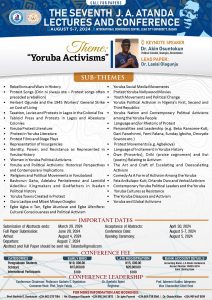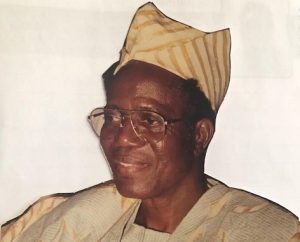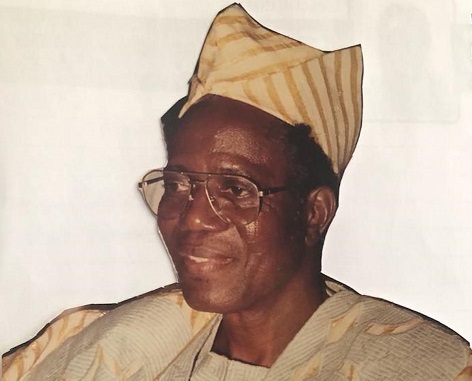
THE SEVENTH J. A. ATANDA LECTURES AND CONFERENCE
Lead City University, Ibadan, Oyo State, Nigeria
August 5-7, 2024
Theme: Yoruba Activisms
Venue: International Conference Centre, Lead City University, Ibadan

Call for Papers
Preamble
The late Prof. Joseph Adebowale Atanda was a scholar of the Yoruba. He was passionate about the people’s past and made concerted efforts to bring to the fore the identity of the Yoruba and what they represent across continents. Concerned by the negative representation by Western scholars, Professor Atanda challenged several notions that the Yoruba people were uncivilized, belonged to a dark past and were primitive. He understood the dangers of stamping a negative narrative on the Yoruba people, which could have long-lasting implications on the people’s identity. African knowledge production and epistemology were at the core of his scholarship and administrative preoccupations at the University of Ibadan. Virtually all of his works remain valuable to understanding how the Yoruba people built one of the most enduring civilisations, whether at Ile-Ife or the Old Oyo Empire. His works are a testament to his resolve to present the facts in an objective way about the Yoruba people’s way of life. This conference aims to unpack this rich history in all its manifestations as part of the series of events in honour of the Yoruba nationalist, author, and historian.
In Yoruba history, panegyrics play an undeniably important role in the definition and understanding of the people. For example, town-centric panegyrics not only serve as eulogies but also open the portal of an anthropological pattern to a people’s culture and behaviours. A brief consideration of the panegyrics of many Yoruba kingdoms and towns would show a clear pattern: one of resilience, self-defence, the readiness to fight for one’s rights, war readiness, and activism. It is in the political culture or, in a manner of speaking in the behavioural DNA of the Yoruba to not turn the other cheek in the face of confrontation or perceived bullying. In writing West Africa’s rich history, the role of the Yoruba as the stewards of an activism-laced, politically resilient narrative holds sway. The Old Oyo Empire, a bastion of Yoruba political prowess that stretched from Oyo-Ile to Dahomey (present-day Benin Republic) at the peak of its existence, is a testament to the political activism of the Yoruba people. In all its civilization, glory, political structures and institutions, the Oyo Empire witnessed bouts of insurgencies, which eventually influenced its collapse. Chief among the political activists whose insurgencies rocked the Oyo Empire was the ploy of Bashorun Gaha, a one-time Prime Minister and Head of the Oyomesi, and the rebellion of Afonja, a warlord.
In his case, Basorun Gaha leveraged the power constituted by the Oyomesi to advance his political ambitions, push for the dethronement of several Alaafins, and expand his political influence. On the other hand, Afonja the Warlord would rather defy tradition than bear the consequences of the foolishness of his army whom he had warned.
Afonja’s reliance on Ilorin as his retirement plan after his fallout with the Alaafin did not bring about the result he expected. The Alimi-led Fulani Muslims were not ready to be led by a non-Muslim, and Afonja was not ready to be converted to the Islamic religion. There was, therefore, a series of revolts that eventually led to Afonja’s death, creating ripple effects that ultimately resulted in the collapse of the great Oyo Empire.
In the thick of colonial rule and the wake of African nationalism in the last and early decades of the 19th and 20th centuries, Yoruba men such as Miojola Agbebi and Sapara Williams challenged religious and colonial norms, setting the pace for other Yoruba in subsequent decades to take Yoruba activism to another level.
This same Yoruba activism was at the heart of the causes of the civil wars that engulfed Yorubaland at the decentralization of the Oyo Empire caused by Alaafin Abiodun’s death. Out of the thickness of these civil wars emerged Ibadan, a city whose entire existence rested on wars and the need to create an accessible and central camp for warriors.
In more contemporary times, Mrs. Funmilayo Ransome-Kuti was the highlight of the 1940s, forming and leading the Abeokuta Women’s Union in a series of political activisms. Mrs Ransome-Kuti’s agitations for better women’s representation fast-tracked the inclusion of Nigerian women among the decision-makers and stakeholders at the grassroots governing level. These agitations and political activities also helped to bring an end to the taxation of market women in Abeokuta.
In like manner, Sir Herbert Macaulay and Chief Obafemi Awolowo were prominent Yoruba political activists who gave their voices, influences, and resources to the struggle to gain Nigeria’s independence from British rule. Although Sir Macaulay was not as Yoruba-centric in his grassroots campaigns as Chief Obafemi Awolowo, there is no denying that they were both two of the hardest-to-ignore thorns in the flesh of the colonial political leaders.
Post-independence Nigeria also witnessed Yoruba activism through the theatre and music exemplified by artists like Hebert Ogunde, Duro Ladipo, and Orlando Owoh, among others. Their plays and songs provided alternative modes of popular activisms that shed light on everyday socio-economic challenges in the country.
In recent times, Yoruba political activisms have been made manifest by the agitations and campaigns of the Egbe Afenifere. Egbe Afenifere has committed itself to lobbying and critiquing governments to promote Yoruba-related agendas. On the other hand, Sunday Adeniyi Adeyemo, popularly known as “Sunday Igboho,” made the news in recent years when he led agitations for the founding and seceding of the Yoruba Nation. Sunday Adeyemo’s agitations were not unconnected to the exploitation and bullying of the Yoruba people in his locality by Fulani herdsmen, presenting a deja vu of the old Oyo Empire. We also seek to complicate the appropriation of the legacies of Yoruba activisms by contemporary Yoruba political leaders whose agenda may not align with the wishes of the Yoruba.
As we unveil the canvas of this Conference on Yoruba Political Activisms, we are pleased to invite scholars and academics to journey through time, exploring the intricate historical and contemporary intersections of Yoruba society and political activisms. We are focused on unravelling layers of Yoruba history by tracing the roots of multi-dimensional activisms, understanding the evolution of Yoruba societies, and deciphering the impact of political activists on the rise and fall of Yoruba empires.
We invite submissions on the following sub-themes, in addition to other ideas that the participants may have:
Sub-Themes
- Rebellions and Wars in History
- Protest Songs (Orin ni siwaju ote – Protest songs often preceded a rebellion)
- Herbert Ogunde and the 1945 Workers’ General Strike on Cost of Living
- Taxation, Levies and Protests in Lagos in the Colonial Era
- Tabloid Press and Protests in Lagos and Abeokuta Colonies
- Yoruba Protest Literature
- Protest in Yoruba Literature
- Protest Films and Stage Plays
- Representation of Insurgencies
- Identity, Power, and Resistance as Represented in Yoruba History
- Women in Yoruba Political Activisms
- Yoruba and Political Activisms: Historical Perspectives and Contemporary Implications
- Religions and Political Movements in Yorubaland
- Bashorun Gaha, Adelabu Penkelemesi and Lamidi Adedibu: Kingmakers and Godfathers in Ibadan Political History
- Yoruba Towns Created in Protest
- Duro Ladipo and Mbari Mbayo Osogbo
- Egbe Agba o Tan, Egbe Atunluse and Egbe Afenifere: Cultural Consciousness and Political Activism
- Yoruba Social Media Movements
- Protest Yoruba Nollywood Movies
- Youth Movements and Political Change
- Yoruba Political Activism in Nigeria’s First, Second and Third Republics
- Yoruba Nation and Contemporary Political Activisms among the Yoruba People
- Language and/or Rhetoric of Protest
- Personalities and Leadership (e.g. Beko Ransome-Kuti, Gani Fawehinmi, Femi Falana, Sunday Igboho, Omoyele Sowore etc.)
- Protest Movements (e.g. Agbekoya)
- Language of Incitement in Yoruba History
- Òwe (Proverbs), Oríkì (praise cognomen) and Ewì (poetry) Relating to Activism
- The Art and Craft of Escalating and Deescalating Activism
- Comedy As A Form of Activism Among the Yoruba
- Fela Anikulapo-Kuti, Orlando Owo and Verbal Activism
- Contemporary Yoruba Political Leaders and the Yoruba
- Yoruba Cultures as Resistance
- The Yoruba Diaspora and Activism
- Yoruba and Global Activisms
Conference Call for Paper Details
Submission of Abstracts ends: ———————————- March 29, 2024
Acceptance of Abstracts: —————————————- April 30, 2024
Full Paper Submission: ——————————————- June 28, 2024
Conference Date: ————————————————- August 5-7, 2024
Arrival: ————————————————————- August 4, 2024
Opening Ceremony: ———————————————- August 5, 2024
Departure: ———————————————————- August 7, 2024
Abstract and Full Paper should be sent via 7atanda@gmail.com
Conference Fee
|
| Categories | Early Bird | Late Registration |
| Postgraduate Students | N10, 000.00 | N15, 000.00 |
| Scholars | N15,000.00 | N20,000.00 |
| International Participants | $100 | $100 |
Note: Late Registration commences on May 30, 2024
For more information and bookings:
- Godwin E. Oyedokun +234 803 373 7184
- Olusegun Olopade +234 810 248 3872
- Igho Fayomi +234 808 738 2160
- Olabisi Killan +234 909 647 5109
E-mail: 7atanda@gmail.com
Conference Chairman
Professor Godwin E. Oyedokun
Convener/Host
Professor Toyin Falola
Dr. Oyebola Ayeni
Registrar, Lead City University
Professor Aderemi Kabiru Adeyemo
Vice Chancellor/Chief Host














You must be logged in to post a comment.